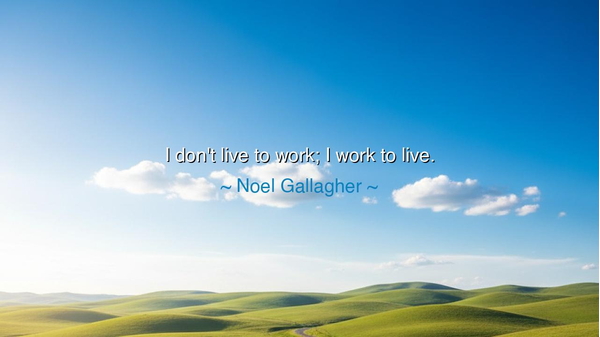
I don't live to work; I work to live.






When Noel Gallagher proclaims, “I don’t live to work; I work to live,” he speaks with the clarity of one who has weighed the balance of existence. His words strike against the chains of endless labor, reminding us that the purpose of toil is not to consume life, but to sustain it. To live is the higher calling, while work is but the servant that enables it.
The origin of this wisdom lies in the struggle of modern man, where many have become enslaved to their labor, forgetting the greater joys of love, beauty, and freedom. Gallagher, a musician shaped by both hardship and triumph, speaks from experience. His cry is not of idleness, but of perspective: that work is necessary, yet it must never overshadow the essence of life itself.
To “live to work” is to sacrifice the soul upon the altar of productivity, to mistake the means for the end. But to “work to live” is to restore balance, recognizing that labor is meant to provide, not to define. Food, shelter, and sustenance are born of work, but laughter, song, and memory are the treasures of life. In this reversal, Gallagher echoes the wisdom of the ancients, who taught that wealth without joy is poverty, and toil without purpose is slavery.
His words also serve as a warning: that man must guard his time and spirit lest he forget why he labors. For when work consumes all, the days slip away, and one awakens to find that he has lived only in service to duty, not to love, family, or wonder. To work to live is to remember that life’s true riches are not wages, but moments of meaning.
Let the generations after us remember: work is the tool, but life is the masterpiece. Noel Gallagher’s words endure as a song of freedom, teaching that the measure of existence is not in endless labor, but in the fullness of living for which that labor was undertaken.






AAdministratorAdministrator
Welcome, honored guests. Please leave a comment, we will respond soon